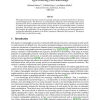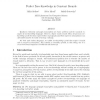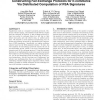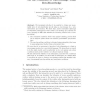118
click to vote
TCC
2010
Springer
14 years 12 months ago
2010
Springer
We revisit the composability of different forms of zero-knowledge proofs when the honest prover strategy is restricted to be polynomial time (given an appropriate auxiliary input)...
119
click to vote
CCS
2008
ACM
15 years 4 months ago
2008
ACM
This paper presents the first type system for statically analyzing security protocols that are based on zero-knowledge proofs. We show how several properties offered by zero-knowl...
ASIACRYPT
2007
Springer
15 years 6 months ago
2007
Springer
A shuffle is a permutation and re-encryption of a set of ciphertexts. Shuffles are for instance used in mix-nets for anonymous broadcast and voting. One way to make a shuffle verif...
112
click to vote
STOC
1990
ACM
15 years 6 months ago
1990
ACM
Quadratic residuosity and graph isomorphism are classic problems and the canonical examples of zero-knowledge languages. However, despite much research e ort, all previous zerokno...
132
click to vote
EUROCRYPT
1999
Springer
15 years 6 months ago
1999
Springer
We examine the concurrent composition of zero-knowledge proofs. By concurrent composition, we indicate a single prover that is involved in multiple, simultaneous zero-knowledge pro...
123
click to vote
PKC
2009
Springer
15 years 6 months ago
2009
Springer
Abstract. Zero-knowledge proofs with witness elimination are protocols that enable a prover to demonstrate knowledge of a witness to the verifier that accepts the interaction prov...
133
click to vote
FOCS
2002
IEEE
15 years 7 months ago
2002
IEEE
We show new lower bounds and impossibility results for general (possibly non-black-box) zero-knowledge proofs and arguments. Our main results are that, under reasonable complexity...
133
click to vote
PODC
2003
ACM
15 years 7 months ago
2003
ACM
Applications such as e-commerce payment protocols, electronic contract signing, and certified e-mail delivery require that fair exchange be assured. A fair-exchange protocol allo...
107
click to vote
FOCS
2003
IEEE
15 years 7 months ago
2003
IEEE
We show new lower bounds and impossibility results for general (possibly non-black-box) zero-knowledge proofs and arguments. Our main results are that, under reasonable complexity...
168
click to vote
TCC
2004
Springer
15 years 7 months ago
2004
Springer
Abstract. We investigate whether it is possible to obtain any meaningful type of zero-knowledge proofs using a one-message (i.e., noninteractive) proof system. We show that, under ...





